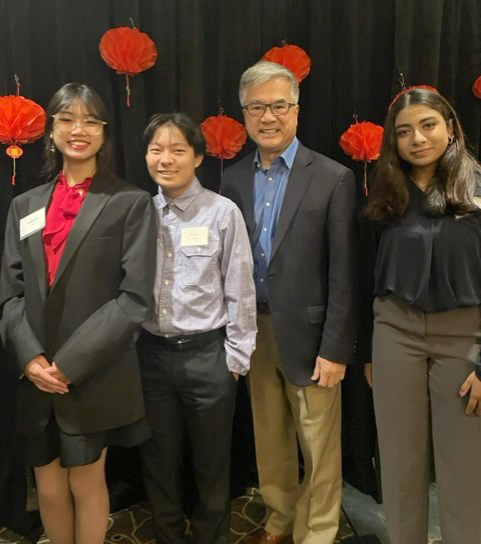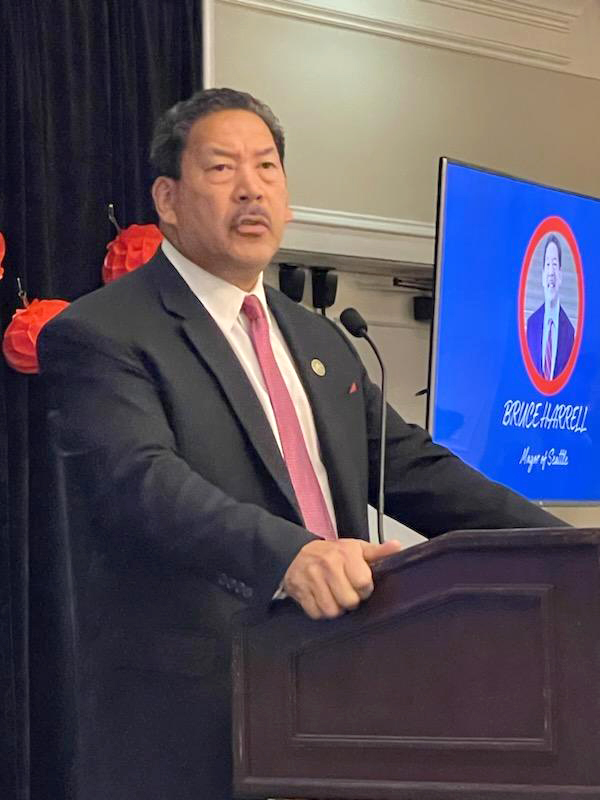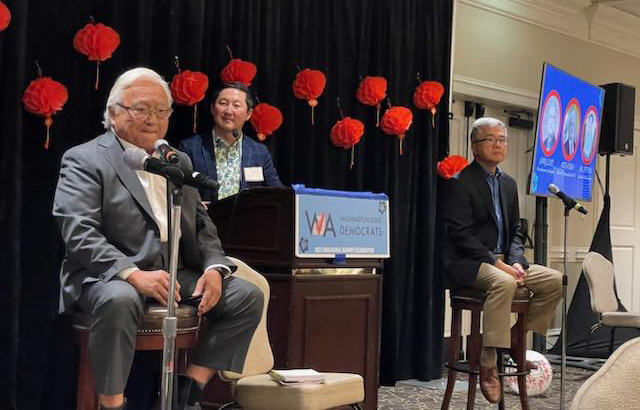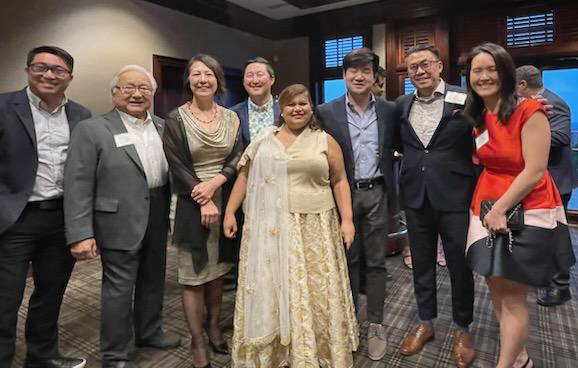By Assunta Ng
NORTHWEST ASIAN WEEKLY
Walking into the inaugural WA State Democrats AANHPI celebration recently, you’d see why the Asian community has done well politically in spite of the rise in anti-Asian hate crimes.
AANHPIs are now the fastest growing group here in Washington and in the United States. About 10% of Washingtonians are Asian Americans, close to 800,000 in 2023. (AANHPI stands for Asian American Native Hawaiian Pacific Islander, an inclusive term designed to embrace the entire Asian community.)
At the Newcastle Golf Club, founded by philanthropist Scott Oki, the best and the brightest were present on Oct. 13. Almost every table out of the 260 guests had one or two former and current elected AANHPI officials seated, including some of the most powerful, nationally-recognized figures. The amount raised surprised the organizers, doubling its goal—from $40,000 to $90,000. These funds will be split between Washington state Democrats and AANHPI Democrats.
“To see pioneers like Congressman Mike Honda (of California), Gov./Ambassador/U.S. Cabinet Secretary Gary Locke, and Seattle Mayor Bruce Harrell was truly motivating,” said Sung Yang, principal of Pacific Political Affairs.
“Seattle is important as it has elected the first Asian American governor, and he was a legislator before,” said Honda, who drove to attend the event from Oregon, where he has retired and is now residing in.
Locke became the first Asian American governor in the U.S. Mainland in 1996 and the first Chinese American governor in the whole country, though the Asian population of our state was barely 4% then. As of today, no other state has elected an Asian governor in the U.S. Mainland. Seattle Mayor Harrell was one of the first three Asian mayors elected in the country in 2021.
The room didn’t just have the star power of the old guards, it was also filled with many young, upcoming leaders of the AANHPI community. Even national high-ranking AANHPI Democrat officials came to support the event.
It showed that Asian Americans have an “impressive political power base,” said David Kim, 36, who is the Washington state Democratic Party treasurer and one of the event organizers.
Promising AANHPI Leaders
“It was very inspiring to see the next generation like Port Commissioner/President Sam Cho, State Sen. Manka Dhingra, and Rep. My-Linh Thai,” said Yang, who hosted a group of high schoolers at his table. “They were so excited to see the broad depth of our community representing them at all levels of political representation. It was an incredible gathering of all the Democratic Asian American elected officials from across our region and state. The event was a testament to how far we have come as a community. I’m feeling invigorated!”
Elected at the age of 29, Cho, now 32, was probably the youngest Asian American to be elected to office in Washington state. “Cho has lifted up our community,” said Bellevue City Council member Janice Zahn, as he has been appointed recently to the City of Seattle’s director of strategic initiatives and also regional and national boards.
But the celebration of AANHPI began with one of its own as the Washington State Democrat Party has elected a new chair.
Democratic Party chair
Ran unopposed, Shasti Conrad, 38, is the first woman of color and the first Asian American woman elected leader for the Democratic Party, not just in Washington state, but the whole country. A former King County Democratic Party chair and Obama appointee, Conrad’s historical win energizes the Asian community.
On the night of the event, Conrad won praise from the attendees. “Shasti is impressive and powerful,” said guest Sharon Lee, executive director of Low Income Housing Institute.
“As the first AANHPI to serve as chair of the Washington State Democrats, I commend Shasti’s vision and leadership in helping to make us all visible,” said Rep. Sharon T. Santos.
Adopted by a white woman, Conrad is of Indian descent and did not hesitate to address the two gorillas in the political mist, Republican presidential candidates Nikkei Haley and Vivek Ramaswamy, who are also Indian Americans.
“These folks do not represent our community!” said Conrad. “They do not care about us. They only care about their own self-serving agenda and building power for themselves (not for all of us).”
She also said, “Democrats had done little for the Asian community,” and decided “it’s time the community celebrated its culture and accomplishment.”
Democrats “did nothing (for the Asian community),” the Asian Weekly corrected her.
New term AANHPI
“Collaboration doesn’t exist in other communities,” said Jeff Roh, IntuitiveX CEO and one of the organizers. “Leaders like Gary Locke and upcoming leaders don’t exist in other communities to validate community effort to organize such an event. We are a tight community.”

Gary Locke with young, upcoming leaders, from left: Angelina Ly, Kelan Sato, Locke and Arya Narendra (Photo provided by Sung Yang)
But even within a tight community, it doesn’t mean that Asian Americans understand and work with one another. Within our community, it is not just Chinese, Japanese, Koreans, Filipinos, Indians, and Vietnamese, often known as the major groups. AANHPI is diverse. There are as many as 40 cultures and subgroups within the community.
Originally, it was AAPI Heritage Month, designated in May 1978. But this year, it has changed to AANHPI. The term is not easy even for Asian Americans to say. Harrell, of Japanese and African descent, led the way by setting an example—repeating it a few times so the audience realized that they were not the only ones who couldn’t say it. And Harrell was frank that he was still learning. “I want to learn more about your cultures,” he said, referring to some of the cultures among the AANHPI that he was unfamiliar with.
Asian community’s struggles
Conrad told the crowd that “the past few years have been hard for the Asian community from “the impact of xenophobia and racism. From the former president stoking the flames of fear and racism about the causes of the deadly COVID-19 pandemic to a spate of hate crimes against Asian Americans both in Washington and nationally.”
Just recently, an Indian student, Jaahnavi Kandula, was killed by police. A Korean family, the Kwons, who owned a restaurant near Pike Place Market, lost their 8-months pregnant wife in a shooting, and the Wing Luke Museum was attacked by a man spewing anti-Asian hate, said Conrad.
And the past history of America has not been kind to AANHPI. She added, “From exclusion to incarceration and many other instances—our community has traveled a hard road to get to where we are today.”
She rallied the community “to build lasting power for AANHPI people in government right now. …We will be seen. We will be valued! We will elect more folks from our community, and we will ensure that I am not the last Asian woman to lead our state party!”
Mama mentor
That night, the Asian Weekly saw Ruth Woo’s legacy expanded to four generations. She died in 2016. Known as a political guru, Woo’s mentees include Gary Locke and many others in the room, as well as those who were unable to attend. Secretary of State Steve Hobbs, who donated to the event, but couldn’t attend, was one of Woo’s mentees.
Woo had worked in several campaigns for Asian and non-Asian candidates, Democrats and Republicans. An influential leader, she would push hard for politicians to appoint Asian Americans in top political jobs and also inspire them to run for office.
Now, the community’s “mama mentor” can smile in heaven, as her fruits of labor have transformed her mentees to plant political seeds among the young. David Kim’s story was an example. Kim received help from Woo’s mentees. As a former intern of Obama’s White House, his internship was unpaid so he couldn’t afford to pay his way and living expenses in DC.
However, Woo’s mentees jumped into action to fulfill Kim’s dream. Former Seattle’s deputy mayor Hyeok Kim (no relations to David), former legislator Velma Veloria, and Rep. Sharon T. Santos organized an event to raise $20,000 for Kim to go to DC several years ago. Santos was also Hyeok’s mentor. Veloria also mentored Toshiko Hasegawa, Seattle Port Commissioner, who won the port race by over 50% as a first-time candidate in 2021.
About 47 former and current elected officials of AANHPI descent attended the event, including several Washington state legislators, elected board members for commissions and schools, and city council members from all over the region. Some of the guests are running for political office for the first time, and at least three are running in tight races.
“We are proud of our community,” said Roh. But he admitted that the event would not be possible five years ago. “Now, it’s our time. We are the fastest growing group… We are powerful…We can make the difference for the margin of victory (in elections). We have been neglected for too long.”
“When we (AANHPI) vote, we win,” he said.
(For self-disclosure purposes, this reporter is an independent, but was forced to mark on the ballot as a Democrat to vote in the last presidential primary, according to state law requirements. And I hope someday I could write about the Republican Party AANHPI celebration!)
Assunta Ng can be reached at assunta@nwasianweekly.com.




